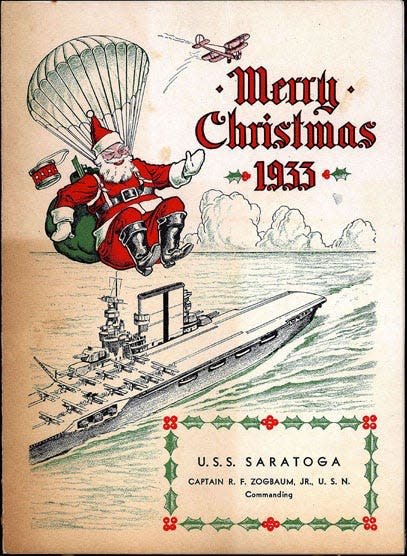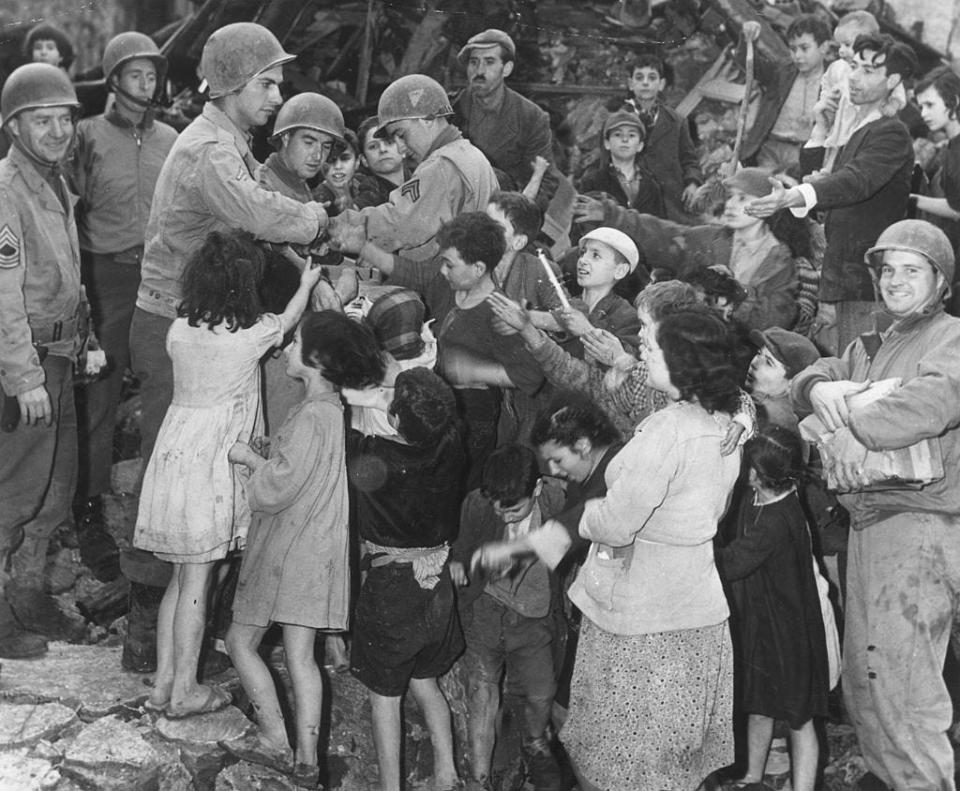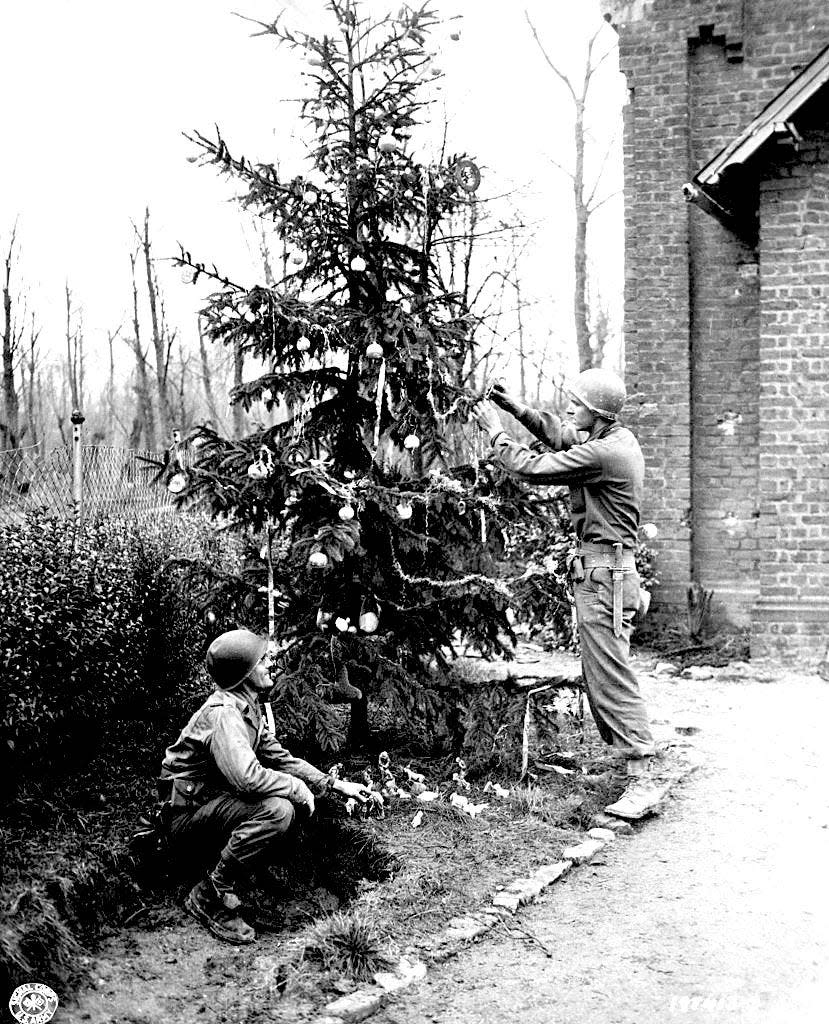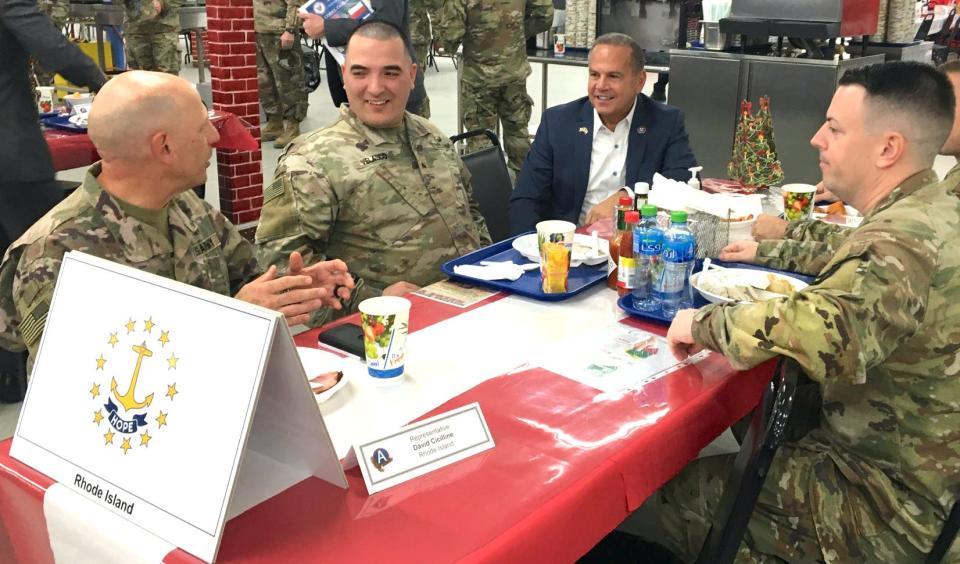Can't come home for Christmas: The remarkable tales of Christmas in the trenches
- Oops!Something went wrong.Please try again later.
- Oops!Something went wrong.Please try again later.
Bing Crosby recorded "I'll Be Home for Christmas" on Oct. 1, 1943, and despite its utter sadness, it remains one of the top Christmas songs of all time. Its timelessness transcends generations. Elvis covered the song in 1957; as did Ol’ Blue Eyes himself, Frank Sinatra. The version sung by Johnny Mathis soared in the charts in the early 1960s. In recent years, Kelly Clarkson, Michael Bublé, Josh Groban and even Rascal Flatts have recorded their own versions.
Seventy-seven years after its original release, the song debuted at number 50 on the Billboard Hot 100 chart dated Jan. 2, 2021.
It was one of my parents’ favorite songs
As a child, I remember mom and dad getting teary-eyed every time they heard it. They had been apart for two Christmases, in 1943 and 1944.
The lyrics purport to be a letter from a soldier stationed overseas during World War II. He tells his family, “You can count on me,” and asks, “Please have snow and mistletoe, and presents on the tree.” The song ends on a melancholy note, with the soldier acknowledging this will happen only in his dreams.

The song struck the right note at the right time for the American people. We were well into the war, and an estimated 16 million Americans (or 11% of the population) were serving in the military. As History Daily reported in 2020, “There was hardly a home in the country that didn't have a conspicuously empty place at the dinner table during the holiday season."
Many of us who served overseas, especially during wartime, have known that pang of extra loneliness on Christmas. And tens of thousands of Rhode Island family members have experienced that sorrow of separation within the last two generations, whether their loved ones were serving in Vietnam, Kosovo, Iraq or Afghanistan. (To say nothing of peacetime deployments to the four corners of the earth.)
What was Christmas like in RI in 1943?
Writing about Christmas Eve 1943, The Providence Journal reported, ”Christmas lights that had stayed in attics in 1941 and 1942 returned,” as the tide of war changed and the submarine threat diminished. Rhode Islanders approached the holiday season with a cautious amount of joy and optimism, tempered in most families by the empty seats around the Christmas dinner table.
On Dec. 26, the paper reported that most servicemen stationed in Rhode Island did not get to celebrate the holiday at all. They were recalled to their duty stations at Quonset and Newport because of a rumored “Sneak attack on Christmas Day.”
“A grim reminder of war, and the potential danger of an enemy attack upon the Atlantic coast, broke in upon Christmas celebrants in Rhode Island yesterday. Military forces were called to their stations in an air raid alert shortly after 4:30 AM.”
At the front
Meanwhile, the men to whom those empty seats belonged did their best to bring a little holiday cheer to their own bleak and dangerous surroundings. It would be two years before they would be back at those holiday dinners, and some would not return at all.
On Dec. 25, AP reported from Italy that “even the mud and rain and the cold and even the Germans just a few yards away couldn’t keep the doughboys from remembering last night that it was Christmas Eve, although they had to celebrate it with a box of K rations.

“Turkey dinners couldn’t reach them last night because the action was heavy. The men stood in the slush of their fighting holes, the rain splashing down in their faces. Their rifles lay on a mud parapet in front of which a lot of their buddies have fallen in battle.”
The homes of most of the kids of Mignano, Italy, were destroyed during the fighting. Several GIs decided to share their Christmas goodies from home with the waifs of war. “So they loaded it up in jeeps on Christmas Eve and took it into Mignano, calling out, ‘Caramella!’ (a generic word for candy).
“The hungry, ragged, dirty kids of Mignano came creeping from caves and cellars, and the wreckage of what had once been their homes. They flocked around, their faces lighting up in anticipation, as the doughboys grinned too.”
Battles at Christmas
War does not take Christmas, Hanukkah, or other major holidays off (with a few remarkable exceptions, one of which is described below). Aggressive leaders will often launch attacks on such days, thinking their enemies will be unprepared. Consider our beloved George Washington’s famed crossing of the Delaware on Christmas Day 1776, catching the Hessian mercenaries by surprise in the Battle of Trenton.
During the Civil War, Union spirits were buoyed as word reached Washington on Dec. 25, 1864, that Savannah had been captured a few days earlier. Gen. William Tecumseh Sherman sent a telegram to the White House declaring Savannah was his Christmas present for President Abraham Lincoln.
Perhaps the most famous Christmas fight was the Dec. 25, 1944, climax to the Battle of the Bulge when British and American troops halted the Germans and relieved the beleaguered town of Bastogne.
During that bloody battle, one of those very unusual exceptions occurred. The following story was first told in Readers Digest in 1973.

Christmas truce, December 1944
A 12-year-old German boy named Fritz Vincken lived with his mother, Elisabeth, in an isolated cottage in the forest near Bastogne. It was Christmas Eve, and Elisabeth was preparing a Christmas soup — despite the sounds of battle raging not far off. She had faint hopes that her husband, serving in the Wehrmacht, might somehow find his way home.
There was a knock at the door. With trepidation, Elisabeth answered it, finding three soldiers, one badly wounded. They spoke a language the boy did not understand; his mother told him they were Americans.
She waved them in and began treating the injured soldier’s wounds. One of the Americans spoke some French, which Elisabeth knew. She said, “It is Christmas Eve. You are safe here.” She added more ingredients to the soup.
Unexpectedly, there was another knock. This time it was four German soldiers, separated from their unit and seeking shelter. Elisabeth said they were welcome to stay, but they had to leave their weapons outside. When one objected she told him, “It is the Holy Night, and there will be no shooting here.” She then gathered the American weapons and put them outside as well.
I can just imagine what the tension must have been like in that tiny cottage as the adversaries stared at each other, not knowing what to make of the situation. Finally, Elisabeth told Fritz to go to the barn and collect their rooster, which they had been fattening in hopes her husband might return.
The group began to relax. When the wounded American moaned, one of the Germans tended to him — he had been a medical student before the war.
Both groups of soldiers searched their backpacks for food to share. The Wehrmacht corporal contributed a bottle of red wine and loaf of rye bread.
When the soup was ready, Elisabeth said grace. Fritz saw tears in his mother’s eyes and noticed that some of the soldiers wept, too, perhaps thinking of their families far away.
The next morning, the soldiers prepared to go back to war. They crafted a stretcher from a pair of poles and Elisabeth’s tablecloth to carry the wounded American. As the Americans checked a map, the German corporal showed them how to get back to their own lines. They then shook hands and headed off in opposite directions.
Fritz immigrated to the United States in 1959 and later opened a bakery in Honolulu. He always hoped to meet the soldiers again. Thinking publicity might help, he began with his 1973 Reader’s Digest article, which President Ronald Reagan mentioned in a 1986 speech. In 1995, Fritz told his story to Robert Stack on “Unsolved Mysteries.”
In December 2022, writer Dave Kindy told “the rest of the story,” Paul Harvey fashion, in a piece in The Washington Post.

A nursing home chaplain in Frederick, Maryland, saw the episode and remembered a resident telling a similar story. He contacted the producers about Ralph Blank, who had been a sergeant with the 8th Infantry Division in 1944.
In 1996, Fritz flew to Maryland to meet with Blank, who was 76 and in poor health. They recognized each other immediately and reminisced about their shared evening of peace during a hellish war.
At one point during the episode, Ralph turned to Fritz and said, “Your mother saved my life.” He was the wounded American.
In a 1997 interview, Fritz spoke of the lessons he'd learned from the Christmas miracle.
“My mother taught me the meaning of the words "goodwill toward mankind,” he said, adding, “I remember mother and those seven young soldiers, who met as enemies and parted as friends, right in the middle of the Battle of the Bulge.”
This article originally appeared on The Providence Journal: Christmas in wartime: Stories of soldiers celebrating in the trenches

